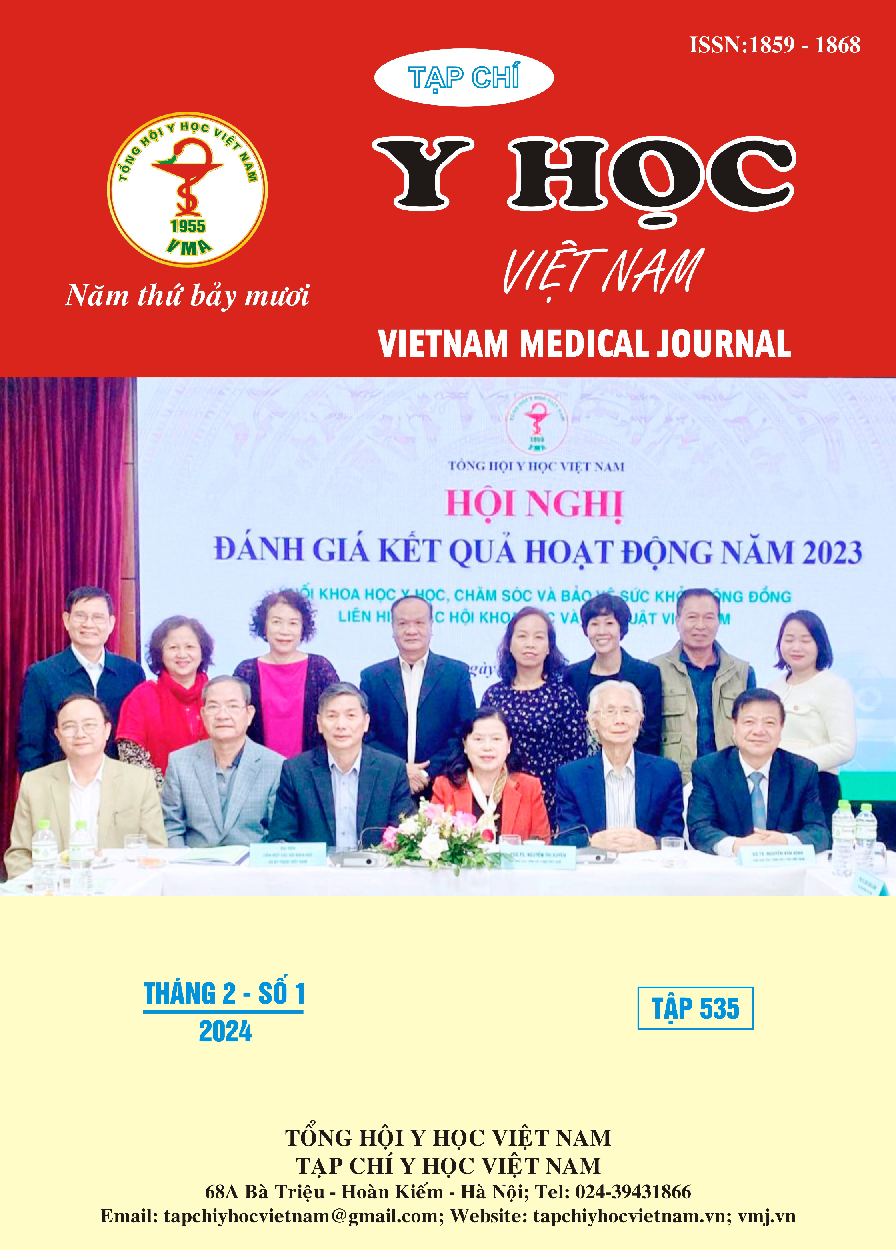RESULTS OF ADJUVANT CHEMOTHERAPY AFTER PREOPERATIVE CHEMORADIOTHERAPY FOR STAGE cT3,4N1-2 OF RECTAL CANCER AT K HOSPITAL
Main Article Content
Abstract
Objective: Evaluation of survival time for patients with rectal cancer stage cT3,4N1-2M0 receiving adjuvant chemotherapy after preoperative chemotherapy at K hospital and description some toxicity of adjuvant chemotherapy. Subjects and Methods: Retrospective describe study on 77 patients with stage cT3,4N1-2 rectal cancer who received adjuvant chemotherapy after preoperative chemotherapy at K hospital from January 2017 to December 2018. Results: DFS at 3 years were 82,8% (95%CI 53,2-62,1). The liver and lungs are common sites of recurrence, accounting for 5.2%. OS at 3 years was 90.8% (95%CI 58.7-64.9). The advantageous factors affected on the 3-year disease-free survival include: disease response after chemoradiotherapy (93.3% vs 85%, p < 0.001), stage N0 after chemoradiotherapy treatment (87.3% vs 82.4% vs 0%, p < 0.001), full 6 cycles of chemotherapy (86.8% vs 45%, p=0.001). The advantageous factors affected on the 3 years overall survival: age ≤ 65 (91.5% vs 88.5%, p=0.024), full 6 cycles of chemotherapy (94.1% vs 62.5%, p=0.01). The hematological toxicities were at grade 1 and 2 include anemia (71.4%), leukopenia (50.6%), agranulocytosis (45.5%), thrombocytopenia (39 %). Side effects on the liver and kidneys are rare, mainly grade 1 and 2. Other side effects are less common. Conclusion: Adjuvant chemotherapy for patients with preoperative chemotherapy and radical surgery for rectal cancer is an effective and safe method.
Article Details
References
2. Gill S, Blackstock AW, Goldberg RM. Colorectal cancer. Mayo Clin Proc. 2007;82(1): 114-129. doi:10.4065/82.1.114
3. Hong YS, Nam BH, Kim K pyo, et al. Oxaliplatin, fluorouracil, and leucovorin versus fluorouracil and leucovorin as adjuvant chemotherapy for locally advanced rectal cancer after preoperative chemoradiotherapy (ADORE): an open-label, multicentre, phase 2, randomised controlled trial. The Lancet Oncology. 2014;15(11): 1245-1253. doi:10.1016/S1470-2045(14)70377-8
4. Glynne-Jones R, Counsell N, Quirke P, et al. Chronicle: results of a randomised phase III trial in locally advanced rectal cancer after neoadjuvant chemoradiation randomising postoperative adjuvant capecitabine plus oxaliplatin (XELOX) versus control. Ann Oncol. 2014;25(7): 1356-1362. doi:10.1093/annonc/mdu147
5. Jin J, Tang Y, Hu C, et al. Multicenter, Randomized, Phase III Trial of Short-Term Radiotherapy Plus Chemotherapy Versus Long-Term Chemoradiotherapy in Locally Advanced Rectal Cancer (STELLAR). JCO. 2022;40(15): 1681-1692. doi: 10.1200/JCO.21. 01667
6. Gérard JP, Azria D, Gourgou-Bourgade S, et al. Clinical outcome of the ACCORD 12/0405 PRODIGE 2 randomized trial in rectal cancer. J Clin Oncol. 2012;30(36):4558-4565. doi:10.1200/ JCO.2012.42.8771
7. Phạm Cẩm Phương. Đánh giá hiệu quả của hóa xạ trị tiền phẫu trong điều trị ung thư trực tràng giai đoạn xâm lấn. Tạp chí ung thư học Việt Nam. 2012;(4):321-326.
8. Corvò R, Pastrone I, Scolaro T, Marcenaro M, Berretta L, Chiara S. Radiotherapy and oral capecitabine in the preoperative treatment of patients with rectal cancer: rationale, preliminary results and perspectives. Tumori. 2003;89(4): 361-367. doi:10.1177/030089160308900403


